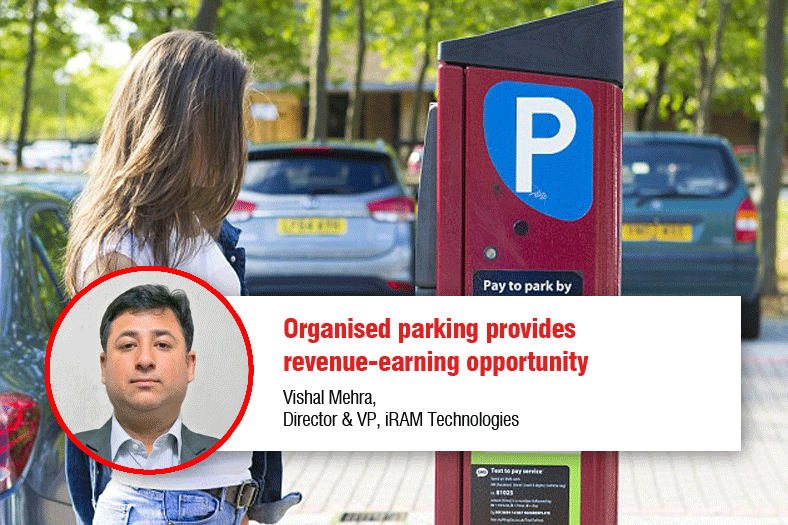Organised parking provides revenue-earning opportunity

Indian economy has made great strides in the last two decades leading to rapid urbanisation and growing affluence of its citizens. Consequently, the number of cars in cities has risen manifold. With increasing usage of vehicles, traffic jams and choked overcrowded city roads are a frequent sight in the current times. This is the result of rural populace migrating to urban areas in search of better opportunities.
According to a recent study by Boston Consulting Group (BCG), traffic congestion during peak hours in 4 metros – Delhi, Mumbai, Bengaluru and Kolkata — costs the economy Rs 1.47 lakh crore annually. The figure will be much higher if we take other cities into consideration.
Of all the infrastructural challenges that urban India is faced with traffic congestion, chaotic parking and lack of parking spaces probably top the list.
To address the various challenges of urban living, government has unveiled Smart Cities Mission that aims to drive growth and improve quality of life, enabling local authorities and municipal corporations to provide better amenities by harnessing technology to create smart outcomes for citizens. A smart city integrates information and communication technology (ICT), and various physical devices connected to the network (IoT and AI), to optimise the efficiency of city operations and services and connect to citizens.
As parking problem runs across urban India, smart cities are adopting smart parking that allows more efficient use of parking spaces, using Internet of Things (IoT)-enabled smart parking solutions to regularize parking and ease traffic congestion. Smart parking, by definition, is using IoT to check availability of parking spaces and pre-book the same using a mobile app. The smart parking system involves extracting field data from parking bays through network of sensors and gateways to efficiently manage on-street, off-street and covered parking spaces real-time. By using the data on parking availability, a real time parking map is created.
A real-time parking map can be used in many ways, including helping drivers find parking easily and quickly through an app and pre-book online, relaying information to parking officials to identify violations, and prompting people to use alternate transportation options in the case of parking congestion.
The technology
Using IoT, all existing parking spaces are equipped with sensors that can help notify users on the availability of a parking spot. All parking lots of the city can be further connected with the city navigation system enabling drivers find the nearest parking location. Smart parking provides prepaid or post-paid payment options and allows variable and demand-based parking fees. It also supports multiple payment methods – cash or cashless, parking permits (reserved parking slots), payment through credit card, debit card, e-wallets, pre-paid city cards. The sensors can be embedded in the ground or cameras can be installed to give real time parking occupancy data.
Once the technology has determined the available spaces, the data is transferred to a cloud or premise-based smart parking platform. This data with other parking availability data creates a real time map. Thus, smart parking system not only optimises usage of the available parking space but also enhances the overall functioning of streets in the city.
Advantages
Organised parking can be a big revenue earner for the government and local municipal corporations. The smart parking system employs IT as the backbone to facilitate greater transparency and efficiency in collection of parking fees, making parking operations in the cities more organised and increasing the revenue potential for the municipalities by preventing pilferage. It offers huge possibility for many organisations to come forward and work on PPP models to modernise parking.
For the owners and operators, it provides all the necessary tools to the owner to optimise the existing parking inventory that gives benefits like increased revenue due to better utilisation, prevents frauds like pass-back, fake tickets, ticketing bye-pass etc., plugs revenue leaks, dynamic pricing, low network bandwidth usage, sales & usage projections, alarms/notifications for low tickets, faulty equipment, frauds etc., avoids additional expenses of constructing new parking structures.
For motorists, the parking provides parking availability information, to help make informed decisions, online (mobile app) for pre-booking, ticketing and payment, reduces the amount of time required to find nearest parking, saves fuel and tire wear & tear, reduced emissions from vehicle.
The thrust on smart cities, parking that has not been given much importance so far, is now proving to be a bottle-neck. City planners have realised it is not possible to build a smart city without smart parking system. Some Indian smart cities like Kanpur, Nashik, New Delhi, Rajkot and Bhubaneshwar have already started implementing the smart parking system. We are likely to witness a huge deployment of smart parking projects in the coming years.
Smart parking offers huge possibility for organisations to come forward and work on PPP models for modernising parking.
Vishal Mehra,Director & VP, iRAM Technologies
Author details:
Vishal Mehra
Director & VP, iRAM Technologies
About the company
iRAM is a product development and technology company with most advanced solutions based on Internet of Things (IoT)
Cookie Consent
We use cookies to personalize your experience. By continuing to visit this website you agree to our Terms & Conditions, Privacy Policy and Cookie Policy.
tags:
Construction







